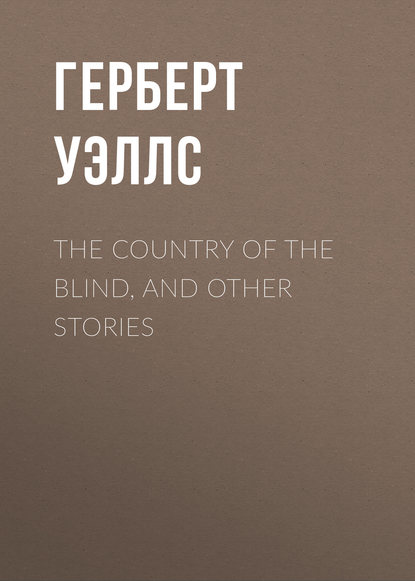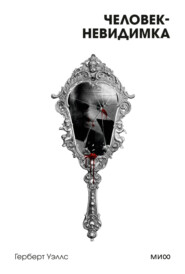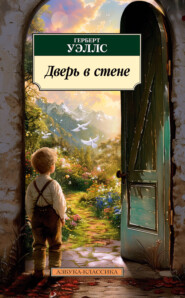По всем вопросам обращайтесь на: info@litportal.ru
(©) 2003-2024.
✖
The Country of the Blind, and Other Stories
Настройки чтения
Размер шрифта
Высота строк
Поля
It was on the August Bank Holiday that the crisis came. We do not clearly know the details of the fray, but only such fragments as poor Jane let fall. She came home dusty, excited, and with her heart hot within her.
The milliner's mother, the milliner, and William had made a party to the Art Museum at South Kensington, I think. Anyhow, Jane had calmly but firmly accosted them somewhere in the streets, and asserted her right to what, in spite of the consensus of literature, she held to be her inalienable property. She did, I think, go so far as to lay hands on him. They dealt with her in a crushingly superior way. They "called a cab." There was a "scene," William being pulled away into the four-wheeler by his future wife and mother-in-law from the reluctant hands of our discarded Jane. There were threats of giving her "in charge."
"My poor Jane!" said my wife, mincing veal as though she was mincing William. "It's a shame of them. I would think no more of him. He is not worthy of you."
"No, m'm," said Jane. "He is weak.
"But it's that woman has done it," said Jane. She was never known to bring herself to pronounce "that woman's" name or to admit her girlishness. "I can't think what minds some women must have – to try and get a girl's young man away from her. But there, it only hurts to talk about it," said Jane.
Thereafter our house rested from William. But there was something in the manner of Jane's scrubbing the front doorstep or sweeping out the rooms, a certain viciousness, that persuaded me that the story had not yet ended.
"Please, m'm, may I go and see a wedding tomorrow?" said Jane one day.
My wife knew by instinct whose wedding. "Do you think it is wise, Jane?" she said.
"I would like to see the last of him," said Jane.
"My dear," said my wife, fluttering into my room about twenty minutes after Jane had started, "Jane has been to the boot-hole and taken all the left-off boots and shoes, and gone off to the wedding with them in a bag. Surely she cannot mean – "
"Jane," I said, "is developing character. Let us hope for the best."
Jane came back with a pale, hard face. All the boots seemed to be still in her bag, at which my wife heaved a premature sigh of relief. We heard her go upstairs and replace the boots with considerable emphasis.
"Quite a crowd at the wedding, ma'am," she said presently, in a purely conversational style, sitting in our little kitchen, and scrubbing the potatoes; "and such a lovely day for them." She proceeded to numerous other details, clearly avoiding some cardinal incident.
"It was all extremely respectable and nice, ma'am; but her father didn't wear a black coat, and looked quite out of place, ma'am. Mr. Piddingquirk – "
"Who?"
"Mr. Piddingquirk – William that was, ma'am – had white gloves, and a coat like a clergyman, and a lovely chrysanthemum. He looked so nice, ma'am. And there was red carpet down, just like for gentlefolks. And they say he gave the clerk four shillings, ma'am. It was a real kerridge they had – not a fly. When they came out of church there was rice-throwing, and her two little sisters dropping dead flowers. And someone threw a slipper, and then I threw a boot – "
"Threw a boot, Jane!"
"Yes, ma'am. Aimed at her. But it hit him. Yes, ma'am, hard. Gev him a black eye, I should think. I only threw that one. I hadn't the heart to try again. All the little boys cheered when it hit him."
After an interval – "I am sorry the boot hit him."
Another pause. The potatoes were being scrubbed violently. "He always was a bit above me, you know, ma'am. And he was led away."
The potatoes were more than finished. Jane rose sharply with a sigh, and rapped the basin down on the table.
"I don't care," she said. "I don't care a rap. He will find out his mistake yet. It serves me right. I was stuck up about him. I ought not to have looked so high. And I am glad things are as things are."
My wife was in the kitchen, seeing to the higher cookery. After the confession of the boot-throwing, she must have watched poor Jane fuming with a certain dismay in those brown eyes of hers. But I imagine they softened again very quickly, and then Jane's must have met them.
"Oh, ma'am," said Jane, with an astonishing change of note, "think of all that might have been! Oh, ma'am, I could have been so happy! I ought to have known, but I didn't know…You're very kind to let me talk to you, ma'am…for it's hard on me, ma'am…it's har-r-r-r-d – "
And I gather that Euphemia so far forgot herself as to let Jane sob out some of the fullness of her heart on a sympathetic shoulder. My Euphemia, thank Heaven, has never properly grasped the importance of "keeping up her position." And since that fit of weeping, much of the accent of bitterness has gone out of Jane's scrubbing and brush work.
Indeed, something passed the other day with the butcher-boy – but that scarcely belongs to this story. However, Jane is young still, and time and change are at work with her. We all have our sorrows, but I do not believe very much in the existence of sorrows that never heal.
II.
THE CONE
The night was hot and overcast, the sky red-rimmed with the lingering sunset of midsummer. They sat at the open window, trying to fancy the air was fresher there. The trees and shrubs of the garden stood stiff and dark; beyond in the roadway a gas-lamp burnt, bright orange against the hazy blue of the evening. Farther were the three lights of the railway signal against the lowering sky. The man and woman spoke to one another in low tones.
"He does not suspect?" said the man, a little nervously.
"Not he," she said peevishly, as though that too irritated her. "He thinks of nothing but the works and the prices of fuel. He has no imagination, no poetry."
"None of these men of iron have," he said sententiously. "They have no hearts."
"He has not," she said. She turned her discontented face towards the window. The distant sound of a roaring and rushing drew nearer and grew in volume; the house quivered; one heard the metallic rattle of the tender. As the train passed, there was a glare of light above the cutting and a driving tumult of smoke; one, two, three, four, five, six, seven, eight black oblongs – eight trucks – passed across the dim grey of the embankment, and were suddenly extinguished one by one in the throat of the tunnel, which, with the last, seemed to swallow down train, smoke, and sound in one abrupt gulp.
"This country was all fresh and beautiful once," he said; "and now – it is Gehenna. Down that way – nothing but pot-banks and chimneys belching fire and dust into the face of heaven…But what does it matter? An end comes, an end to all this cruelty…To-morrow." He spoke the last word in a whisper.
"To-morrow," she said, speaking in a whisper too, and still staring out of the window.
"Dear!" he said, putting his hand on hers.
She turned with a start, and their eyes searched one another's. Hers softened to his gaze. "My dear one!" she said, and then: "It seems so strange – that you should have come into my life like this – to open – " She paused.
"To open?" he said.
"All this wonderful world" – she hesitated, and spoke still more softly – "this world of love to me."
Then suddenly the door clicked and closed. They turned their heads, and he started violently back. In the shadow of the room stood a great shadowy figure-silent. They saw the face dimly in the half-light, with unexpressive dark patches under the pent-house brows. Every muscle in Raut's body suddenly became tense. When could the door have opened? What had he heard? Had he heard all? What had he seen? A tumult of questions.
The new-comer's voice came at last, after a pause that seemed interminable. "Well?" he said.
"I was afraid I had missed you, Horrocks," said the man at the window, gripping the window-ledge with his hand. His voice was unsteady.
The clumsy figure of Horrocks came forward out of the shadow. He made no answer to Raut's remark. For a moment he stood above them.
The woman's heart was cold within her. "I told Mr. Raut it was just possible you might come back," she said in a voice that never quivered.
Horrocks, still silent, sat down abruptly in the chair by her little work-table. His big hands were clenched; one saw now the fire of his eyes under the shadow of his brows. He was trying to get his breath. His eyes went from the woman he had trusted to the friend he had trusted, and then back to the woman.
By this time and for the moment all three half understood one another.
Yet none dared say a word to ease the pent-up things that choked them.
It was the husband's voice that broke the silence at last.
"You wanted to see me?" he said to Raut.
Raut started as he spoke. "I came to see you," he said, resolved to lie to the last.

















